 by Gerry Wang
STIGMATA
(Patricia Arquette, Gabriel Byrne, Jonathan Pryce, Nia Long; directed by Rupert
Wainwright)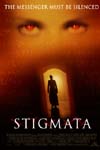
by Gerry Wang
Hmmm, how to review this movie w/o stirring up controversy..... I don't
think it's possible, unless I do a half-assed review like most critics and just toss in a
bunch of ludicrous, cockamamy adjectives. But I won't, because I feel the issue at the
heart of STIGMATA is the root of all religious strife for the past 2000 years. Me being a
history major, I will now bore you w/ historical evidence that explains what the hell I'm
talking about.
0 BC/AD --> Jesus is born.
33 AD --> Jesus is crucified by the Romans as a threat to
insurrection, but not after spreading his message to thousands. 50 days after Easter, at
Pentecost, the Holy Spirit inhabits disciples, and they are inspired to create an
organized religion. The church is formed.
313 AD --> Emperor Constantine grants freedom of religion to
Christians, through the Edict of Milan. Christianity eventually becomes the official
religion of the Roman Empire. The Roman CATHOLIC Church.
1100s AD --> Crusades in Europe fought over invasions by Muslims.
Christians kill people to take back Jerusalem. Blood is spilled for hundreds of years. The
Catholic Church gains even more influence over political and economic issues, obtaining
ever more territory.
1500s AD --> Protestant movement begins, spreading throughout Western
Europe, as a result of dissatisfaction w/
Catholic doctrine and dogma. The Catholic Church is alarmed because it undermines their
authority. (No authority/followers = no revenue)
1618-1648 --> The Thirty Years' War ravages Europe. It begins as a
civil war between Catholics and
Protestants in German states, but descends into a general struggle for territory and
political power. Horrendous violence leaves a long lasting scar on Europe.
1600-1800s --> Numerous Protestant sects gain believers, each w/ their
own specific set of beliefs regarding prayer and worship.
Present --> Unity movement of 19th and 20th Centuries has eased
hostility between the 3 different sectors of Christianity: Protestants, Catholics,
Orthodox. Religious tolerance and truce is preached instead. The Catholic Church,
while still the predominant sector, has lost its fair share of worshippers.
---------------------------------------------------------
Ok, while that little timeline is stupid, you can refer back to it
whenever I mention stuff that might not make sense. The point is, the Church, actually all
organized religion in general, has come to depend upon its people as sources of power,
both politically and economically, as well as egotistically. In order to enforce and
preserve this authority, it has frequently resorted to hypocrisy and treachery, witness
the Thirty Years' War and Spanish Inquisition, etc. The hierarchy in the Vatican is strict
and hallowed, and the Pope can exert unfathomable influence on anyone in the Western
world.
But what if, one day, all this authority came crashing down and fell
apart? Absolute anarchy would reign. The people would become disillusioned, their entire
lives of faith in question. This is the premise that STIGMATA proposes. While this
question is legitimate, and one that is rarely tackled in cinema due to its touchy nature,
STIGMATA as a movie felt like it had too many directions it felt like going, too many
paths it wanted to travel down, and it strove too hard to be hip and modern.
It felt too MTV-ish and not horror-ish. I found myself thinking, wait,
is this a demon-possession movie? Or is it a ghost story? Or is it a religious question?
STIGMATA tried to be all of these, and ultimately it couldn't. However, the attempt was
very noble, and the MTV-like direction (quick cuts, quick pans, bleached colors, rapid
editing) was at times extremely effective at conveying the utter terror of a real life
stigmatism. Stigmata is the occurrence of the Crucifixion wounds of Christ on another
person, usually a devoted spiritual person.
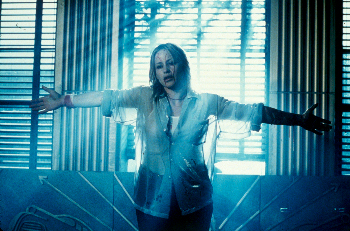
The story begins with the death of Father Alameida, who was
excommunicated from the Catholic Church for translating the "Lost Gospel" of
Jesus. He was also a stigmata sufferer. In his town there were mysterious miracles
happening, such as the Virgin Mary crying tears of blood. To debunk these
"miracles," in order to maintain order and suppress hysteria, the Vatican sends
Andrew Kiernan (Gabriel Byrne) to investigate. Andrew is a scientist turned priest, and we
all know what kinda conflicts science has w/ religion.
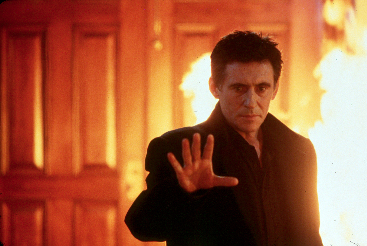
Anyways, Frankie Paige (Patricia Arquette) receives the late Father
Alameida's rosary beads as gift, and immediately suffers the stigmata. Something is
possessing poor Frankie, who isn't religious at all and is in fact a big time sinner (we
learn this right from the beginning, where she engages in premarital sex). So Andrew
Kiernan is sent to investigate this as well.
Soon, we learn the connection between Frankie's possession by Father
Alameida and how it ties to the "Lost Gospel." But getting there was a confusing
battle. At first I thought STIGMATA was about a chick being possessed by the anti-Christ,
or Satan or something. That's how they were marketing it. Then, as I watched, it became a
ghost haunting story, but that was never fully developed. Then it finally blossomed into a
religious debate, but that seemed to come out of nowhere, rather than tie up the loose
ends. However, overall, STIGMATA was thoroughly enjoyable. It wasn't scary, it wasn't too
violent, but I applaud its daring to bring up a long-brewing topic regarding faith and the
Church.
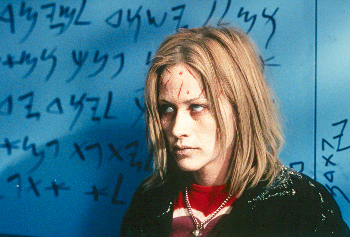
SPOILERS (I think).............................
You see, what STIGMATA essential says is that we don't need the church.
We don't need organized religion. All we need to get into Heaven is to live a moral life
and have faith in the Lord. Eating bread and drinking wine doesn't mean you deserve
salvation. It's what's inside you. It's your goodness. This is ultimately what God will
judge you on, on Judgement Day. And no, we all won't go to Hell for not believing. Why
should we go to Hell if we lived a modest, prosperous and sin-free existence? Don't gimme
that going to Hell bullshit.
I don't call myself religious. Hell, my Bible serves as a bookend. But
I do have a Bible because I believe that it contains the words of Jesus, and I believe in
Jesus. I believe in God. I believe in working hard and treating people right. I dunno if I
believe in miracles, but hey, I haven't lived my whole life yet. But I don't believe that
not going to church every freakin Sunday is going to send me to Purgatory. I don't sin. I
haven't killed anyone. Goddamn it, I'm a good person! Why does everyone tell me I'm gonna
burn when I die? Is it because Jesus said so? Did he, I dunno.
But according to STIGMATA, Jesus tells me, in the "Lost
Gospel," that I'm entirely correct. But do you see how the Church would be
threatened? Their existence is no longer necessary. It's through threat that you can refer
back to the timeline and see all the bloodshed that has occurred over the Church
protecting its ass. Do you seriously think Jesus wants his children slaughtering one
another? Hell no. (Pun intended)
The Protestant movement started because Martin Luther, Calvin, and the
rest of the founders were fed up w/ Catholic dogma. They believed in secular worship, and
the Catholics were pissing their pants at the prospect of losing congregations. So to
solve this they massacred one another for hundreds of years.
---------------------------------------------------------
I probably stirred some controversy with my last few paragraphs, but
hey, blame STIGMATA. The movie only touched upon the tip of the iceberg though, I felt it
should have devoted less time to style and more to thematic elements. I wished it played
more like a straight-up episode of The X-Files or something. Straight drama building up to
resolution, then more questions are raised than answered. Something like that. But
instead, Rupert Wainwright gives us a slashing style w/ strobe light effects that make you
want to avert your eyes. Given the material of another movie, say SEVEN, then Wainwright
would have done a majestic job. But I felt the topic in discussion was too venerable and
sacred to be reduced to a music video frenzy.
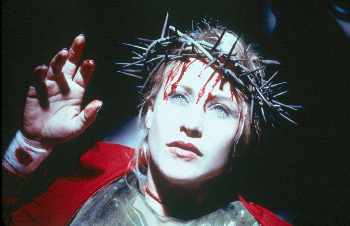
But the performances stand out most from STIGMATA. Patricia Arquette
does a good job and making us sympathize for her. Frankie's a sweet girl who just needs a
little direction, away from raving and stuff. She's the last person who deserves to suffer
such horrible injurues as the stigmata. Gabriel Byrne also does a commendable job at
portraying a priest torn between his faith and his profession. He wants to remain
objective, but sometimes it's at the cost of his devotion. Byrne shows restraint aptly.
You know, there's rumors of Byrne being involved in Episode II, as
either a Jedi or a Sith. After watching STIGMATA, I'm hoping to God (yeah yeah, I know)
that he has a part because he can do sheer evil, or in STIGMATA's case, stoic heroicism.
Perfect for a Jedi. When Andrew was around, I felt the protection of God under the wing of
his messengers. Sort of like the Force. Sorta.
So watch STIGMATA expecting a religious story. It ain't EXOCIST. Fuck
that. There are no sinister entities in this movie. It's a ghost story as well, and damn
it I've spooked myself all over again while typing this review. Freakin THE SIXTH SENSE's
fault. And watch for the incredible visuals Wainwright presents, and appreciate his
MTV-ish direction for what it is, and not to its relevance to the story.
**1/2 out of 4
Babe-o-meter: DISCONTINUED
|

